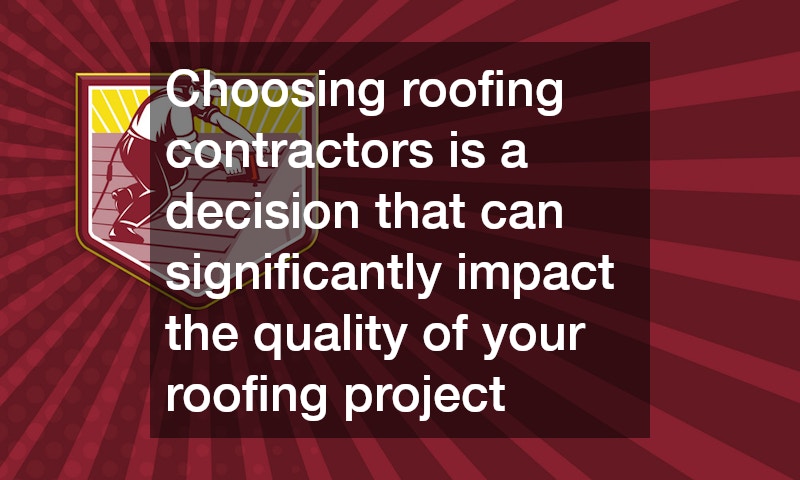Choosing the right roofing contractors for your next project is a critical step toward ensuring a durable, attractive, and properly installed roof. Whether you are repairing damage or undertaking a full replacement, finding professionals who combine expertise, reliability, and fair pricing can be daunting. This guide will walk you through essential factors to consider when evaluating roofing contractors, helping you make an informed decision that protects your investment.
How to Verify the Credentials of Roofing Contractors
One of the first steps in choosing roofing contractors is to verify their credentials. This verification ensures you’re working with qualified professionals who meet local standards and regulations.
Licensing is a key component; licensed contractors have passed state or local requirements proving they understand roofing codes and safety practices.
Additionally, certifications from manufacturers or industry organizations can indicate a higher level of expertise. For example, contractors certified by roofing material manufacturers have likely completed specialized training on installation techniques.
Insurance is another crucial credential to check. Reliable roofing contractors carry both liability insurance and workers’ compensation. Liability insurance protects you if property damage occurs during the project, while workers’ compensation covers injuries sustained by workers on your property. Asking for proof of insurance before hiring protects you from potential financial liability.
What Should Be Included in a Roofing Contractor’s Estimate?
Understanding a roofing contractor’s estimate is vital to avoid surprises and hidden fees. A comprehensive estimate should clearly outline the scope of work, including the type and quantity of roofing materials to be used. Materials such as shingles, underlayment, flashing, and nails should be specified by brand and quality.
Labor costs should also be detailed separately, showing the number of workers involved and the expected hours to complete the project. This transparency helps you understand what you’re paying for and compare estimates accurately.
The timeline for the project is another essential element. Roofing contractors should provide an estimated start date and projected completion date to help you plan accordingly. Also, payment terms need to be clearly laid out, including deposit requirements, progress payments, and final payment conditions.
By reviewing these components carefully, you can avoid contractors who provide vague or incomplete estimates, which can lead to unexpected expenses or project delays.
How to Assess the Reputation and Reliability of Roofing Contractors
Evaluating the reputation of roofing contractors is a key factor in finding trustworthy professionals. Start by reading online reviews on platforms like Google, Yelp, or the Better Business Bureau. Look for patterns in customer feedback, paying attention to comments about workmanship, punctuality, and communication.
Requesting references directly from contractors is another effective strategy. A reputable roofing contractor should be willing to provide contact information for past clients. Speaking with these references allows you to ask specific questions about their experience, satisfaction level, and whether the project was completed on time and within budget.
Additionally, checking with local business bureaus or trade associations can reveal any complaints or disciplinary actions. Combining these research methods will give you a clearer picture of a contractor’s reliability and professionalism.
How to Ensure Effective Communication and Project Management with Roofing Contractors
Clear communication and project management are essential for a successful roofing project. Before hiring, discuss your expectations thoroughly with roofing contractors, including your goals for the project, any concerns, and preferred work hours.
Establishing a single point of contact within the contractor’s team can help streamline communication and avoid confusion. This person can provide regular updates on progress, any challenges encountered, and changes to the schedule or budget.
It’s also wise to set up a written contract that outlines all agreed-upon terms, including the work scope, payment schedule, warranties, and cleanup responsibilities. This contract acts as a safeguard and reference point should disputes arise.
Regularly monitoring the project helps ensure that the roofing contractors adhere to the agreed schedule and quality standards. Don’t hesitate to ask for progress photos or arrange site visits if possible.
Closing Thoughts
Choosing roofing contractors is a decision that can significantly impact the quality, cost, and longevity of your roofing project. By thoroughly verifying credentials, carefully reviewing estimates, assessing reputations, understanding local roofing materials, and maintaining open communication, you position yourself for a successful roofing experience. Take the time to evaluate each potential contractor with these factors in mind, and you’ll be well on your way to a roof that protects your home for years to come.




